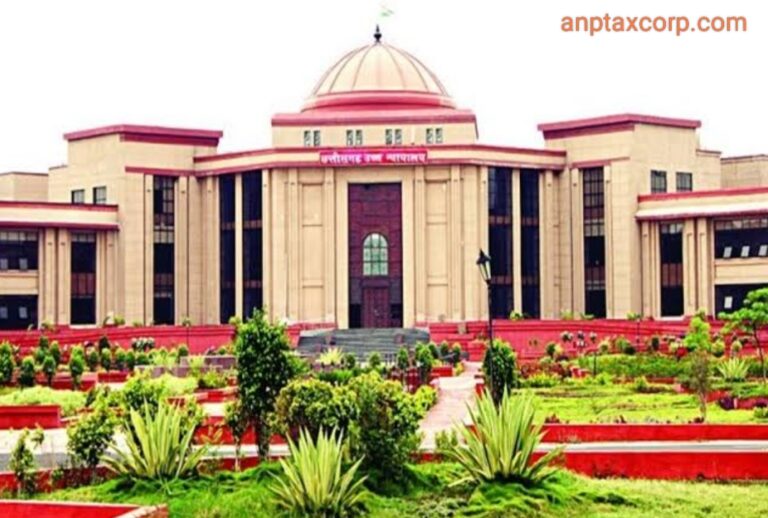In a significant judgment, the Chhattisgarh High Court has ruled that assessment proceedings pending before the Income Tax Appellate Tribunal (ITAT) shall be deemed to be pending before the Assessing Officer (AO) for the purpose of granting retrospective benefit under the first proviso to Section 12A(2) of the Income Tax Act. The Court held that since appellate proceedings are a continuation of assessment proceedings, trusts receiving registration under Section 12AA during such pendency are entitled to claim exemption for the relevant years. This ruling strengthens the position of bona fide charitable trusts seeking tax exemption benefits.
📄 Case Snapshot
Case: Commissioner of Income‑Tax (Exemption), Bhopal v. Shree Vimalnath Jain Swetamber Mandir Trust
Court: High Court of Chhattisgarh at Bilaspur (Division Bench)
Citation: TAXC No. 31 of 2019; Judgment on 1 April 2025.
Bench: Hon’ble Justices Sanjay K. Agrawal & Sanjay K. Jaiswal
🧭 Background
- The trust applied for Section 12AA registration to avail exemption under Sections 11 & 12.
- CIT (Exemption), Bhopal rejected registration on 28 March 2018, finding that the trust carried out religious but not charitable activities.
- The trust appealed to ITAT (Raipur), which overturned the CIT’s order on 16 January 2019, holding that both religious and charitable purposes were present.
- Revenue appealed to the HC challenging ITAT’s decision.
⚖️ Key Issues before HC
- Nature of Trust Objects: Are they purely religious, or both charitable and religious?
- Validity of ITAT’s Deeming Rule: Should the assessment proceedings pending before ITAT at the time of registration be treated as pending before AO under the first proviso to Sec. 12A(2)?
🔍 Court’s Analysis & Findings
1. Nature of Trust Objects
- ITAT carefully reviewed the trust deed and concluded it served both charitable and religious purposes.
- HC upheld this factual finding, noting it wasn’t perverse or legally unsound.
2. Applicability of Sec. 12A(2) Proviso
- Section 12A(2) (as amended by FA 2014) provides that if registration under Sec. 12AA is granted during the pendency of “assessment proceedings before the AO,” the exemption applies to those pending assessments too.
- HC referenced binding decisions (e.g., Ananda Social & Educational Trust and International Healthcare Education & Research Institute), recognising that “activities” may include proposed ones, supporting retrospective benefit.
- Emphasised doctrine: appeals before ITAT are a continuation of AO proceedings. The appellate body’s authority is co-terminus with the AO’s power.
Thus, where ITAT hears an appeal, that appeal is legally “assessment proceedings pending before the AO.”
🏁 Final Verdict
- HC affirmed ITAT’s order, mandating CIT (Exemption) to register the trust under Sec. 12AA.
- Two key takeaways:
- Registration under 12AA deemed valid when objects include charitable activity alongside religious aims.
- First proviso to Sec. 12A(2) applies even if assessment is pending before ITAT—not just the AO—when registration is granted.
✍️ Why This Matters
- Good news for trusts & NGOs: If they secure Sec. 12AA registration while appeals are pending before ITAT, they can claim exemptions for those years—even if AO had completed assessments earlier.
- Protects charitable trusts from losing out on exemptions due to procedural delays in registration.
- Clarifies legal interpretation: ITAT hearings qualify as “proceedings before the AO” for Sec. 12A(2) purposes.
✅ Practical Takeaways for Stakeholders
- Trusts should file for Sec. 12AA registration promptly—even during appeal stages.
- Retrospective benefit under Sec. 12A(2) covers both AO and ITAT pendency.
- Always substantiate that trust objects serve a charitable purpose—crucial for HC upholding factual findings.
This landmark ruling ensures that genuine charitable trusts are not unfairly penalised due to procedural timelines. For tax practitioners, it’s a strong basis to assert exemption claims when registration overlaps with pending appeals—even at ITAT.
